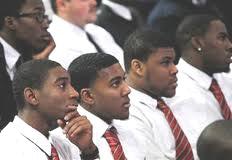
So what can we do to encourage more of these young men to not only enroll, but also to graduate, from our nation’s colleges and universities? It will take a multifaceted approach to raise the numbers of Black young men going to college significantly, but I do believe it is possible to accomplish, and soon.
To make it happen, we need to:
Acknowledge there is a problem. As a culture, we need to do a better job of admitting that we are making mistakes when it comes to the education of young Black men. This is especially true of educators. This notion that these young men have just the same opportunities as their classmates and that succeeding is solely up to them is flawed. These boys arrive in classrooms with a cloud of discrimination over them, even if it is not conscious on the part of the educators. We are too quick to write these boys off, too quick to say that they are “on their own” in their successes — and we need to change that mentality in order to change their collective futures.
Start early with targeting. After the acknowledgement that this group of young men needs our help to navigate K-12 learning and ultimately graduate from college, we need to put programs in place to make this happen. The positivity of a college education should be pointed out as early as elementary school and then reinforced as students get older. In high school, Black young men should be encouraged to take Advanced Placement courses and be introduced to college-level materials. School counselors should suggest clubs, volunteer opportunities and even jobs that align with the college goals of these young men and explain how each plays into their career goals.
Provide mentors. It’s no secret that most of the faces Black young men view in classrooms look nothing like theirs. Even in this day and age of increasing diversity in the teaching field, the majority of K-12 teachers are women and are White. Of course, adding more Black men to the teaching workforce is a step in the right direction, but we should also seek out other opportunities for mentorship. Community leaders who are men of color should be part of the K-12 experience for Black boys in order to show them what is possible with hard work and yes, a college education. This mentorship can be as simple as men who present to a full classroom of students to those who work one-on-one in after-school tutoring or athletic pursuits.
Re-evaluate school discipline procedures. The school-to-prison pipeline is real. Kids who are suspended, expelled or arrested at a young age are at a much higher risk of ending up in prison later in life. The group that is suspended, expelled or arrested on school grounds the most? Yep. Black young men. Is this group of young men genuinely worse than their peers, or are they simply disciplined more harshly? I think the answer to that lies somewhere in the middle. It is hard to deny that Black young men are viewed through a harsher lens than their peers, but there may also be some truth to this notion that they misbehave more often, too (not because they inherently misbehave more but because of outside environmental factors like single-parent homes and poverty that impact them more than other student groups). With both of these reasonable assumptions in mind, educators should look for specialized systems of discipline that work for Black boys — that keep them in school settings while keeping classroom processes streamlined and effective for other students.
We need to take seriously this lack of Black men in our colleges and universities. More education means a better quality of life for these groups of students and an improved way of life for the rest of us, too. It will take some cooperation between educators starting at the early childhood level and extending to the college setting — but that effort is necessary if we want to see these young men truly succeed.


















